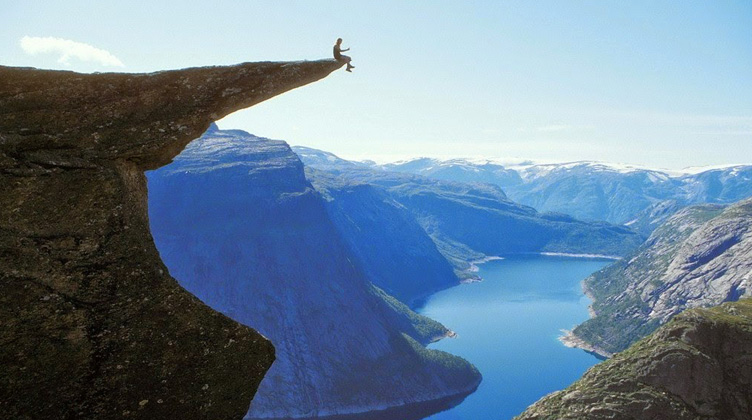A thing called “the edge” entered our lexicon long ago. “Living on the edge,” we might hear someone say, or perhaps a thing described as “edgy” or “over the edge.” We sense that the edge describes a sort of desperate frontier between something and something else, but our curiosity about this thing, this edge, curiously stops there.
It is because there is something powerful and unspeakable about the edge, something our minds reflexively protect us from.
The edge is a state, a condition we can live in – a plasma form of the mind, like fire. The edge questions. It doubts. It needs to know why, and it will. It is restless and tireless. The edge is the constant search for the real. Water on the ground exists in the edge state; it is always seeking.
The edge exists most fully in tension, dissatisfaction, and pain points. It is the awareness of the need to see things as they really are, and it is that quest to see.
And in the category of quality of life, the edge is the unique agent of the integration of life and the avowed enemy of life’s mediation.
This type of tension and the relentless search to relieve it inspires anxiety and anger, fear and exhaustion – maybe all at once. It is for this reason that we often shrink from the challenge of the edge, that we avoid casting our minds into that flux state, the edge’s glowing plasma. We will take the first exit from that terrible route that comes along, whatever might relieve that primitive singing gut string and the responsibility of further seeking. The edge requires from us a category of effort that – by definition – we can never become comfortable with providing. The edge causes the heart to race and the mind to spin out of control. The edge is the next-door neighbor to panic.
As we pull ourselves back away from this edge, suddenly comforted by our actions to remove this existential threat to the status quo – even though it is in reality an agent working in our favor – opportunists migrate into the space we create there, mediators that bridge the very gaps that the edge sought to understand and conquer. These mediators convince us – falsely, alas – that there is no real need to understand things so completely. They offer us an easy way to a watered-down understanding, a simplified version of things – foods, physical activity, social connection, mindfulness, happiness – and we are only too happy to accept this easier path, even though it brings with it acceptance of their version of the real.
But we know that it is not real, even as we relax and bask in its false starlight. Because we have known the edge. We saw it with our own eyes and witnessed as it caused our hearts to race and our minds to spin. This new, anemic reality is the enemy of the edge, in fact is the very darkness the edge seeks to disperse.
As we sit in our overstuffed chairs and consider a life of ease, the voice in the back of our minds doesn’t go away, will never go away. We can silence it to a degree, but the edge is a thing that – once seen – cannot be unseen. Once we understand that this state of disquiet exists and have beheld its power, it is forever part of us, even if we never again choose to direct our path toward it. It remains a part of us forever.
There are innumerable benefits to be had from seeing life through the edge’s lens. What happens as we let ourselves relax into that state, to settle into the cataclysmic moment of the edge? Suddenly the answers that we have, the providers of those answers, and the institutions that back those providers are all suspect in their every detail. The edge takes over our mind and exerts itself upon us and upon our environment. The edge, it must be remembered, is always the edge. It is elemental, primeval. It has been with the human race since before we were humans.
And yet as the edge takes control of us, even with its risks and danger, we begin to see a light on the horizon that we hadn’t seen. It is the gloaming of the truth that we see, as light emerges from nothing, and meaning from meaninglessness begins to reveal itself. The edge races headlong toward it, baying like a pack of slavering hounds, falling toward it like water over a cataract, inevitability incarnate, in a torrent. We have begun to see things as they really are. The truth now surrounds us, and the edge, even if for only the briefest moment, rests.

